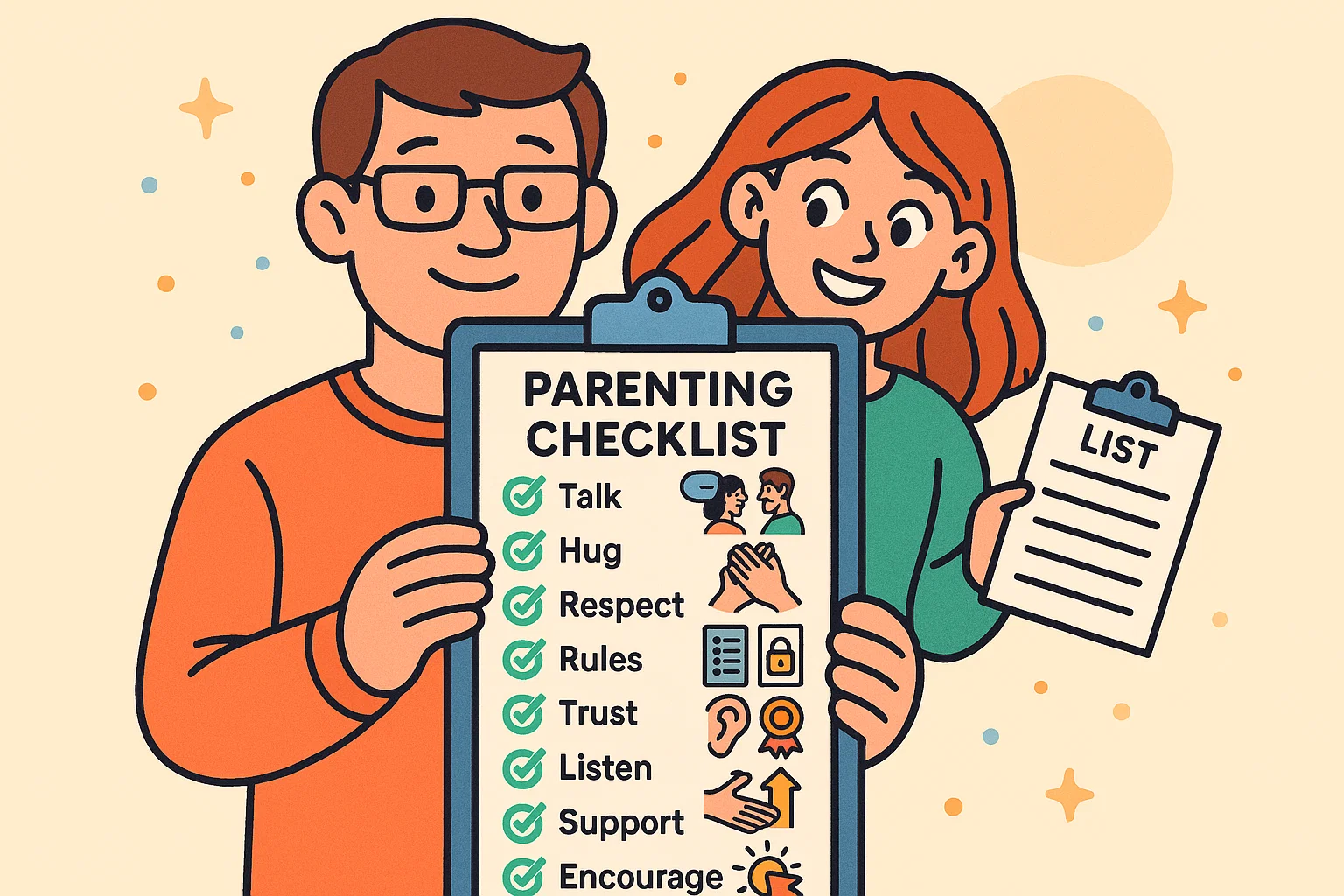Parenting a teenage girl can feel like navigating uncharted waters. One moment she’s your little girl seeking comfort, and the next, she’s rolling her eyes and declaring her independence. Raising teenage girls brings unique challenges that test even the most patient parents, but with the right approach, this phase can strengthen your relationship rather than strain it.
Research from the American Psychological Association’s 2023 survey shows that 33% of parents report high levels of stress in the past month compared to 20% of other adults, with stress levels particularly elevated during their child’s adolescent years. Understanding what’s happening beneath the surface of teenage behavior is crucial for maintaining connection during these transformative years.
Parents of teenage girls often feel overwhelmed, but remember that your teen daughter needs your guidance now more than ever, even when she seems to push you away.
Challenges of Parenting a Teenage Daughter
The transition from childhood to adolescence brings profound changes that affect every aspect of your daughter’s life. These changes are natural and necessary for healthy development, but they can create tension within family lives. Understanding these challenges helps you respond with empathy rather than frustration when parenting teenagers.
Mood Swings and Hormonal Shifts
Puberty typically begins around age 11 for girls, bringing significant hormonal fluctuations that directly impact emotional regulation. During this time, your teenage daughter’s brain is literally rewiring itself, particularly in areas responsible for decision-making and emotional control.
What’s happening biologically:
- Estrogen and progesterone levels fluctuate dramatically
- The prefrontal cortex (responsible for rational thinking) is still developing
- Sleep patterns naturally shift, making teens feel tired during traditional school hours
How to respond supportively:
- Acknowledge that mood swings are temporary and normal
- Avoid dismissing her emotions with phrases like “you’re just being dramatic”
- Create predictable routines that provide stability amid internal chaos
- Ensure adequate sleep (8-10 hours) and proper nutrition
According to neuroscientist Frances Jensen, teenage brains simply aren’t anywhere near as developed as once believed, specifically lacking development in the frontal lobe due to insufficient myelin, which explains why teens may make impulsive decisions or have difficulty managing emotions.
Seeking Independence and Pushing Boundaries
Your teen daughter’s drive for independence is a healthy developmental milestone, not a personal rejection. This natural process helps her develop critical life skills and establish her own identity separate from family expectations. When your daughter is beginning to judge and think critically about the world around her, this represents normal cognitive development.
Common independence-seeking behaviors:
- Wanting more privacy in her room and personal matters
- Questioning family rules and traditions
- Spending more time with friends than family
- Making decisions without consulting parents first
Respectful ways to support autonomy:
- Gradually increase freedoms based on demonstrated responsibility
- Allow your daughter to make low-stakes mistakes and learn from consequences
- Involve her in family decision-making processes
- Respect her emerging opinions, even when they differ from yours
Parent-Daughter Conflicts
Research indicates that parent-teen conflicts peak around ages 13 or 14, with daughters experiencing slightly more intense disagreements than sons. These conflicts often center around daily routines, social activities, and personal choices. The fact that eye rolls and attitude increase during this period is completely normal – eye rolls are a sign that your daughter is developing her own perspective on the world.
Common argument triggers:
- Curfew times and social restrictions
- Academic performance and future planning
- Clothing choices and personal expression
- Technology use and screen time limits
De-escalation strategies:
- Take a pause before responding when emotions run high
- Use “I” statements instead of accusatory language
- Focus on the underlying need rather than the surface behavior
- Schedule regular one-on-one time for non-conflict conversations
Communication Strategies That Build Trust
Open communication forms the foundation of a strong relationship with your daughter during adolescence. When teens feel heard and understood, they’re more likely to seek guidance during difficult times. Research from the Pew Research Center shows that teens who feel overwhelmed by social media drama (45%) and pressure to post engaging content (37%) benefit significantly from strong family communication.
Communicating with your teenage daughter requires patience and skill, but the investment pays dividends in maintaining connection during these crucial years.
Active Listening Techniques
Active listening involves fully engaging with your teen daughter’s perspective without immediately jumping to solutions or judgments. This skill becomes particularly crucial when dealing with teenage emotions and concerns. Parents must understand that teens need time to process their thoughts and feelings.
Practical active listening steps:
- Put devices away and make eye contact
- Reflect back what you hear: “It sounds like you’re frustrated because…”
- Ask clarifying questions before offering advice
- Validate emotions even if you disagree with actions
- Summarize the conversation to ensure understanding
Example response transformation:
- Instead of: “That’s not a big deal, you’ll get over it”
- Try: “I can see this situation is really weighing on you. Tell me more about what happened.”
Asking Open-Ended Questions
Open-ended questions invite dialogue and show genuine interest in your teen daughter’s inner world. These questions demonstrate that you value her thoughts and experiences as valid and important. Take your child’s perspective seriously by asking thoughtful questions.
Effective conversation starters:
- “What was the best part of your day today?”
- “How did that make you feel when your friend said that?”
- “What do you think would be a fair solution to this problem?”
- “If you could change one thing about school, what would it be?”
- “What’s something you’re excited about this week?”
Questions to avoid:
- “Did you have a good day?” (yes/no response)
- “Why did you do that?” (often sounds accusatory)
- “Don’t you think you should…?” (leading question)
Setting the Right Tone
The tone you establish in conversations with your teenage daughter significantly impacts her willingness to open up. Balancing firmness with kindness requires intentional effort, especially during stressful moments. Understanding and empathy should guide every interaction.
Tone guidelines:
- Calm and steady during emotional storms
- Curious rather than interrogating when asking about her life
- Respectful even when discussing consequences
- Warm and approachable to encourage future conversations

Setting Healthy Boundaries Without Conflict
Teenagers need structure and boundaries to feel safe while developing independence. Clear expectations help teens make better decisions and understand family values. However, the way you establish and enforce these boundaries can either strengthen or strain your relationship with your daughter.
Creating rules for living that work for your whole family requires collaboration and consistency. When parenting teen girls, remember that they respond better to guidelines they help create.
Creating House Rules Together
Collaborative rule-making increases your teen daughter’s investment in following family guidelines. When teens participate in creating rules, they better understand the reasoning behind them and feel more respected in the process. This approach helps your daughter feel valued while maintaining necessary structure.
Steps for collaborative rule-making:
- Family meeting to discuss necessary rules and expectations
- Everyone contributes ideas and concerns
- Negotiate reasonable compromises where possible
- Write down agreed-upon rules clearly
- Regular review and adjustment as needed
| Rule Category | Example Collaborative Approach |
| Curfew | Discuss safety concerns and social needs together |
| Chores | Let her choose which responsibilities she prefers |
| Technology | Create family media agreements with input from all |
| Friends | Establish guest policies that work for everyone |
Following Through with Consequences
Consistency in discipline matters more than severity. When consequences are predictable and logically connected to choices, teens learn to make better decisions without feeling like rules are arbitrary or unfair. This approach helps make them feel safe within clear boundaries.
Effective consequence principles:
- Natural consequences when possible (forgot lunch = hungry at school)
- Logical connection between choice and outcome
- Reasonable timeframe for consequences
- Opportunity for redemption through better choices
Avoiding power struggles:
- State consequences calmly without arguing
- Allow natural learning opportunities when safe
- Focus on future behavior rather than past mistakes
- Acknowledge when she makes good choices
Respecting Her Need for Privacy
Privacy needs increase significantly during adolescence as teens develop their individual identity. Respecting appropriate privacy builds trust while maintaining necessary parental involvement in important matters. Allow your daughter age-appropriate independence while staying connected.
Healthy privacy boundaries:
- Knocking before entering her room
- Not reading her diary or personal messages without serious safety concerns
- Allowing private conversations with friends
- Respecting her need for personal space
Areas requiring parental involvement:
- Safety concerns or risky behavior
- Academic struggles affecting her future
- Mental health red flags
- Legal or financial implications
Supporting Mental and Emotional Well-being
Teen life can be emotionally turbulent, making mental health support crucial. Parents play a vital role in helping their daughters develop emotional intelligence and resilience that will serve them throughout life. Girls need to know that their emotions are valid and that seeking help is a sign of strength.
Validating Her Emotions
Emotional validation doesn’t mean agreeing with every reaction or decision. Instead, it acknowledges that your teen daughter’s feelings are real and understandable, even when her response needs adjustment. Many girls feel things very intensely during adolescence, and this is completely normal.
Validation techniques:
- “I can understand why you’d feel disappointed about that”
- “That sounds really frustrating to deal with”
- “Your feelings make sense given what happened”
- “It’s normal to feel confused about this situation”
Avoid minimizing responses:
- “You’re overreacting”
- “It’s not that big of a deal”
- “You’ll understand when you’re older”
- “Stop being so dramatic”
Encouraging Healthy Coping Skills
Teaching your teen daughter healthy ways to manage stress and difficult emotions provides lifelong benefits. These skills help her navigate challenges independently and build resilience. Girls tend to internalize stress, so providing healthy outlets is especially important.
Healthy coping strategies to encourage:
- Physical activity (sports, dance, yoga, walking)
- Creative expression (art, music, writing, crafts)
- Mindfulness practices (meditation, deep breathing, journaling)
- Social connection (talking with trusted friends or family)
- Professional support (counseling when needed)
Warning signs of unhealthy coping:
- Extreme social isolation
- Significant changes in eating or sleeping patterns
- Self-harm behaviors
- Substance use
- Persistent sadness or anxiety
Watching for Signs of Stress or Anxiety
Many teenage girls experience increased anxiety during adolescence, with WHO data showing that 5.5% of 15-19-year-olds experience anxiety disorders, and depression affects 3.5% of this age group. According to the American Psychological Association, 70% of U.S. teens aged 13-17 identify anxiety or depression as major issues among their peers. Early intervention can prevent more serious mental health challenges. Parents may notice changes before teens recognize the problem themselves.
Behavioral red flags:
- Significant drop in academic performance
- Withdrawal from previously enjoyed activities
- Extreme mood changes or irritability
- Physical complaints without medical cause
- Sleep disturbances or changes in appetite
When to seek a mental health professional:
- Symptoms persist for more than two weeks
- Self-harm or suicidal thoughts
- Inability to function in daily activities
- Substance use or other risky behaviors
- Your parental instincts suggest something is seriously wrong

Navigating Social Media and Peer Pressure
Digital life significantly impacts teenage development, with 95% of teens having access to smartphones and social media platforms. Understanding this digital landscape helps parents provide appropriate guidance and support. Teenage girls who are active on social media worry about their online image constantly.
Setting Screen Time Limits
Research suggests that excessive screen time can impact sleep, academic performance, and mental health. However, completely restricting technology isn’t realistic or beneficial for teens who need digital literacy skills. Girls go online to connect with friends and explore their interests, so balance is key.
Balanced approach to screen time:
- Create tech-free zones (dinner table, bedrooms after certain hours)
- Model healthy technology use as a parent
- Discuss the importance of face-to-face interactions
- Use parental controls as training wheels, not permanent solutions
- Regular family discussions about digital citizenship
Red flags for problematic usage:
- Inability to put devices away during family time
- Declining grades or sleep due to late-night usage
- Extreme emotional reactions when technology is limited
- Neglecting real-world relationships and activities
Talking About Online Safety and Self-Image
Social media can significantly impact body image and self-esteem, particularly for teenage girls. Research indicates that girls experience anxiety and depression at much higher rates (39%) than boys (5%) during adolescence. Social media worry about people tagging them in unflattering photos is common among teen girls.
Many girls report feeling bad about themselves when nobody likes their posts or when they compare themselves to others online. This is a critical area where parents must offer support and guidance.
Key topics to address:
- Digital footprint and permanent nature of online posts
- Body image issues and comparison on social platforms
- Cyberbullying recognition and response strategies
- Privacy settings and information sharing
- Healthy skepticism about online content and influencers
Conversation starters:
- “What do you think when you see those perfect photos online?”
- “How do you decide what to post or share?”
- “What would you do if someone was mean to you online?”
- “How can we tell if something online is true or fake?”
Girls worry about how they look when they post pictures, and media worry about people tagging them affects their self-esteem. Address these concerns with understanding and practical advice.
Helping Her Handle Peer Pressure
Peer influence peaks during adolescence, but parents can help their daughters develop confidence to make independent decisions aligned with family values. Teens need support in figuring out how to deal with social pressures without compromising their values.
Building resistance to negative peer pressure:
- Role-play difficult social situations at home
- Discuss family values and why they matter
- Praise independent thinking and good decisions
- Help her find friends who share similar values
- Build confidence in her own judgment
Sample role-play scenarios:
- Friends encouraging skipping school
- Pressure to engage in sexual activity
- Being asked to lie to parents about activities
- Dealing with exclusion or bullying
Help your daughter understand that she can spend time with friends while maintaining her own standards and values.
Promoting Self-Esteem and Personal Growth
Healthy self-esteem develops through genuine accomplishments, supportive relationships, and internal validation rather than external approval. Parents play a crucial role in fostering authentic confidence in their teenage daughters. Building self-worth during adolescence sets the foundation for lifelong confidence.
Celebrating Her Strengths
Focus praise on effort, character, and growth rather than appearance or natural talents. This approach builds intrinsic motivation and resilience when facing challenges. When raising a teen daughter, recognize that girls need validation for their capabilities, not just their looks.
Effective praise strategies:
- “I noticed how hard you worked on that project”
- “Your kindness toward your friend was really thoughtful”
- “You showed great perseverance when that was difficult”
- “I’m proud of how you handled that challenging situation”
Avoid appearance-focused or comparison-based praise:
- “You’re so much prettier than…”
- “You’re the smartest in your class”
- “You’re perfect just the way you are” (creates pressure)
Involving Her in Decision-Making
Age-appropriate decision-making opportunities help teenage daughters develop confidence, critical thinking skills, and a sense of agency in their own lives. When your daughter is going through major developmental changes, involving her in family decisions shows respect for her growing maturity.
Examples of appropriate decisions by age:
| Ages 13-14 | Ages 15-16 | Ages 17-18 |
| Extracurricular activities | Part-time job choices | College and career planning |
| Room decoration | Curfew negotiations | Financial responsibilities |
| Friend group activities | Course selections | Dating relationships |
Encouraging Hobbies and Passions
Creative and physical outlets provide stress relief, skill development, and identity formation during adolescence. Supporting your teen daughter’s interests shows that you value her as an individual. Girls need diverse experiences to develop confidence outside the family.
Benefits of diverse activities:
- Physical activities improve mood and body image
- Creative pursuits provide emotional expression
- Academic clubs build intellectual confidence
- Volunteer work develops empathy and purpose
- Social activities strengthen peer relationships

When Parenting Gets Tough: Staying Calm and Grounded
Even the most patient parents face moments of frustration, exhaustion, and doubt when parenting a teenage girl. Managing your own emotions and maintaining perspective is crucial for effective parenting during these challenging years. Remember that parenting teenage daughters requires extra patience and understanding.
Don’t Take Behavior Personally
Understanding the difference between normal teenage development and personal disrespect helps parents respond appropriately rather than reactively. When your daughter may seem to reject your values or push you away, remember this is often part of normal development.
Normal teenage behavior (not personal):
- Testing boundaries and pushing limits
- Expressing different opinions and values
- Wanting more independence and privacy
- Mood swings and emotional reactions
- Preferring friends over family time
Concerning behavior (needs attention):
- Consistent disrespect and cruel language
- Deliberately harmful or destructive actions
- Complete disregard for family rules and safety
- Persistent lying about important matters
Understanding that teenagers may act out when they’re struggling internally helps parents respond with compassion rather than anger.
Practicing Patience and Self-Care
Parental burnout is real and can negatively impact your ability to support your teenager effectively. Taking care of your own mental health isn’t selfish—it’s necessary for good parenting. A parent’s well-being directly affects their ability to provide stable support.
Self-care strategies for parents:
- Regular exercise and adequate sleep
- Social connections with other adults
- Professional support when needed
- Hobbies and interests outside of parenting
- Mindfulness practices to manage stress
Signs you need support:
- Feeling overwhelmed most days
- Losing patience frequently
- Questioning your parenting abilities constantly
- Physical symptoms of chronic stress
- Relationship strain with your partner
Seeking Professional or Community Support
Knowing when and how to seek additional support demonstrates wisdom and strength, not failure as a parent. Sometimes parents need time to listen to expert advice for parents facing challenging situations.
When to consider professional help:
- Family conflicts are escalating despite your efforts
- Your teen daughter shows signs of mental health concerns
- You feel overwhelmed and unable to cope
- Substance use or risky behaviors emerge
- Academic or social functioning significantly declines
Types of support available:
- Family therapists who specialize in adolescent issues
- Parent support groups in your community
- School counselors who know your daughter
- Parenting classes focused on teenagers
- Online resources from reputable organizations
Ten Tips for Parents of Teenage Girls
Here are ten essential tips for parents navigating the challenges of raising teenage girls:
- Listen more than you speak – Give her time to express herself fully
- Validate emotions even when you disagree with behavior
- Set clear boundaries with love and consistency
- Model healthy relationships and communication
- Support her interests and individual growth
- Stay calm during emotional storms
- Build trust through honesty and reliability
- Encourage independence gradually and safely
- Take care of yourself to be the best parent possible
- Remember this phase is temporary but your relationship is permanent

Final Thoughts for Parents Raising Teen Girls
Living with a teenage daughter is one of life’s most challenging and rewarding experiences. While adolescence can test your patience and wisdom, remember that this phase is temporary. Your teen daughter is not trying to hurt you—she’s trying to figure out who she is and how she fits in the world.
Parents of teenage girls must remember that their influence extends far beyond these challenging years. When you offer support and guidance with consistency and love, you’re helping shape a future adult who will carry your values forward.
Stay connected, stay calm, and trust the process. The little girl who once needed you for everything is becoming a young woman who will choose to include you in her life because of how you navigate these crucial years together. Your influence matters more than you know, even when it doesn’t feel that way.
Remember: She’ll eventually grow out of the eye rolls and attitude, but she’ll never outgrow her need for a parent who believes in her, supports her dreams, and loves her unconditionally through every stage of life.
Adolescence doesn’t last forever, but the relationship you build during this time can last a lifetime.


